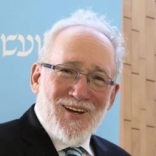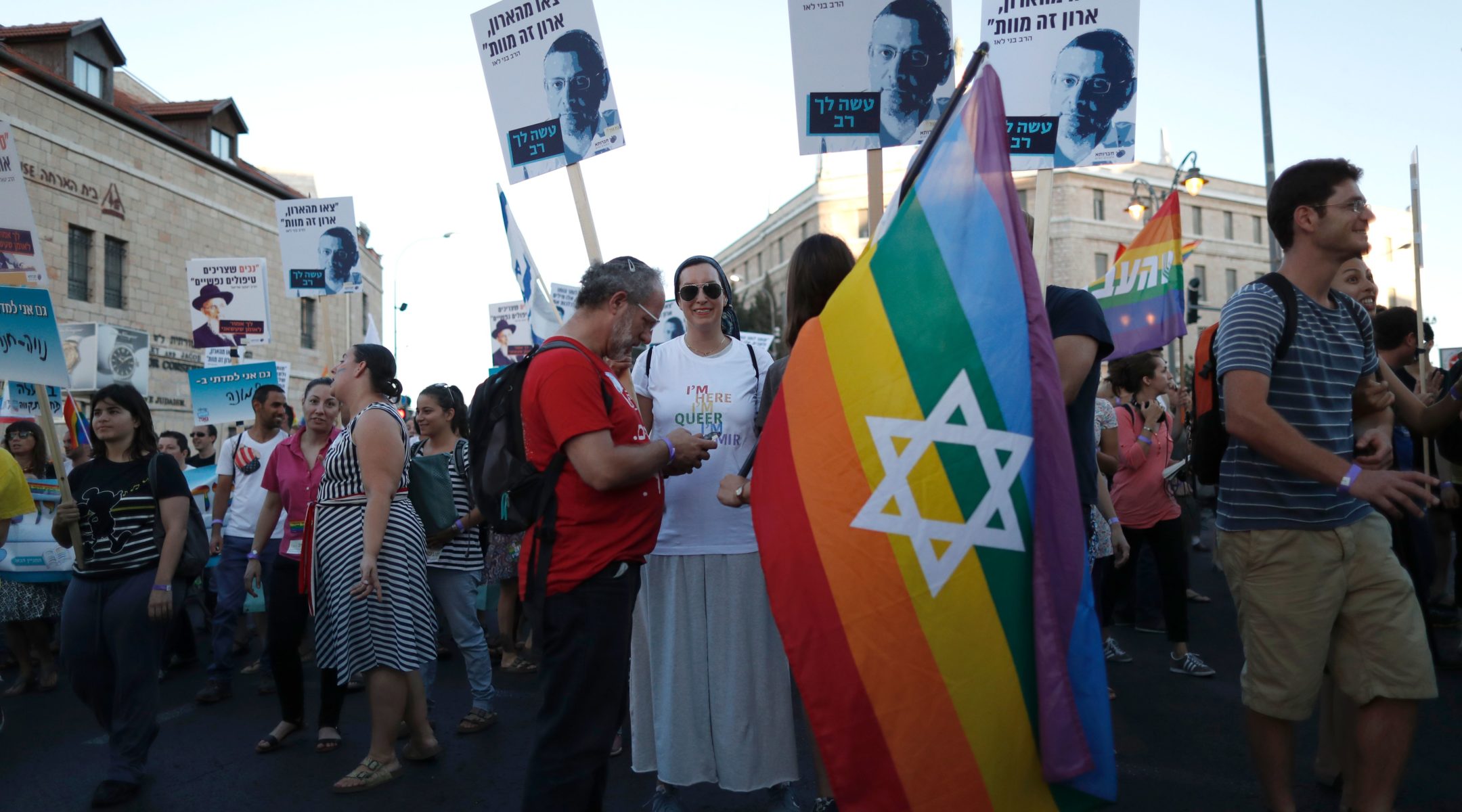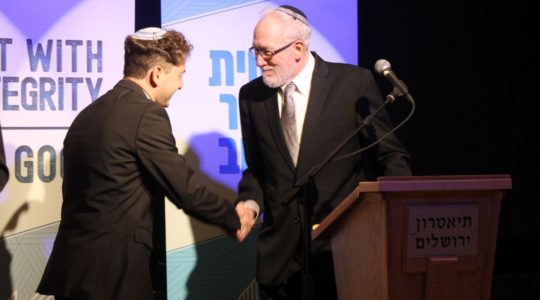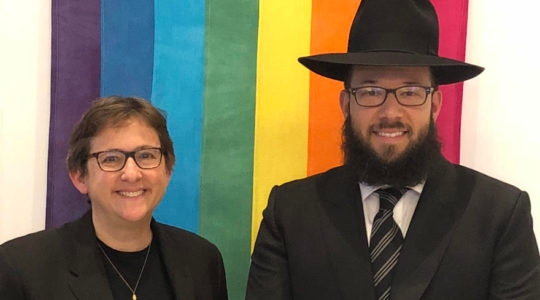JERUSALEM (JTA) — On May 24, the Jewish Telegraphic Agency reported that I would be ordaining a gay Orthodox rabbinical student who was denied the opportunity to receive smicha from his own Orthodox yeshiva. On May 26, I did so, ordaining Rabbi Daniel Atwood during a ceremony attended by more than 200 guests.
I have been an Orthodox rabbi for a long time, and I know my decision will be met with shock and exasperation by many members of the Orthodox community.
But I also know that our community desperately needs gay Orthodox rabbis, and we ignore that communal need at our own peril.
Leviticus 18:22, which states that “thou shalt not lie with a man as one lies with a woman; it is an abomination,” has not been erased from the Torah. But that biblical commandment does not give us license to ignore or abuse the significant number of carefully observant Jews who are LGBTQ.
Unfortunately, that has often been the reality. The contemporary Orthodox approach to these individuals, with a few notable exceptions, has proven worthless or even dangerous.
Orthodox yeshivot will tell you that they simply don’t have such students. For gay students to survive in such an environment, they must not give any hint to their orientation, which in the hot-house of yeshiva life soon becomes a radical form of self-denial.
When this tension cannot be sustained, their rabbis, parents, charlatans and quack “healers” often prescribe “conversion therapies” that not only don’t “cure,” but actually damage both the body and soul. Conversion therapies typically utilize repeated inducements of shame and pain, and most often lead to a breakdown rather than a successful modern-day exorcism. Nobody gets cured; plenty of people get hurt.
These interventions feed an even more toxic and powerful denial: “Maybe we do have gay individuals in our school, family or community – but they can be fixed.”
Another popular solution has been to advocate celibacy. But “just don’t do it” is not as simple as it sounds. We do not have any support system in Judaism for such a course. Judaism is so nuclear-family oriented that being single is considered a sin, or a waste, or at best a misfortune. Our one controlled study of enforced celibacy, the Roman Catholic Church, has seen what can happen when you deny the basic human need for intimacy.
The worst, albeit most traditional “solution,” is to marry the boys off so they can “learn” to be heterosexual. When I was a Modern Orthodox rabbi near Beverly Hills, young and very frum newlywed women often came to me for halachic, or Jewish legal, advice. A number would recount sexual difficulties, sometimes with the news that their husbands were homosexually inclined and that they went out to gay bars. Some wives even “caught something” from their husbands. It was a mess. Learning to be a heterosexual is a ridiculous proposition causing much harm to all.
These ill-advised approaches have led many LGBTQ Jews to abandon Orthodox life altogether. If gay Jews leave the religious path, they disappear from our communities – and the theological conflicts also vanish with them. Just as these renegades eat shellfish, we might say, so too the men sleep with other men. This is not a real solution, but it has been the unspoken modus operandi for as long as I can remember.
But many other LGBTQ Jews wish to, and do remain, observant. What do we do when LGBTQ Jews are frum, punctilious and even learned or learning?
During my rabbinic career, I thought I treated gay Jews in my congregation and yeshiva no differently than straight ones. I am now not so confident. I chose to ignore the fact that gay halachic Jews exist. My form of denial was hoping that maybe they would just go away – maybe to another congregation, or anywhere else.
Because of my commitment to Orthodox Judaism, I can no longer do this or justify the approach, either from a halachic or meta-halachic point of view. Those who are committed to the dignity of both individual Jews and our communities will find that they cannot in good conscience, either.
The halachic reason is that gay Jews are asked to meet a virtually impossible standard of behavior. If they violate that standard, they are either censured or thrown out of the Orthodox community. The enforcers of this contract – rabbis, parents, educators and fellow adult students – know deep down that this agreement will never work. The stipulations, such as remaining in the closet or being celibate for life, are fanciful rejections of reality.
This contract, simply, is neither good nor workable. The individual bound by it lacks any real gemirat da’at, complete acceptance, to fulfill or not violate the stipulations, for doing so would go against his or her own identity.
This leads to a meta-halachic point, which distinguishes Judaism from Christianity. Paul saw the Law as creating sin, for the Law is impossible to fulfill. Salvation, therefore, must be found outside the Law, in Christ. Orthodox and classical Judaism, in contrast, affirms that the Law indeed can and therefore must be fulfilled. Salvation is to be found within the Law. But by having a group of people – gay Jews – who cannot keep the laws surrounding homosexuality, Orthodoxy drives itself to an untenable reality.
The need for a new category
Is there a way out of this impasse?
The law of Leviticus is in full effect, and we Orthodox Jews must live by the words of the Sages and all of the early authorities.
But adherence to halacha must be read with halachic eyes, addressing reality as it is, not how we wish it to be. And the reality is that LGBTQ Jews exist and many wish to be and are halachically observant. No denial nor delusion will change this. Purported “medical” cures are quackery, and parallel social ones lead to terrible results.
Bearing this reality in mind, some halachic eyes have read the situation as one of “ohnes” – duress, a force that compels one to do something even if one ostensibly does not want to. When that force is completely external halacha exempts the person from punishment – Ahnus rachmana patrei (if one acts under duress, the Merciful One exempts him). The classic case is the raped woman who must have “cried out but there was no one to save her” (Deuteronomy 22:6-7). Clearly, no hint of wrongdoing is to be ascribed to her; she is completely innocent. Maimonides makes it clear that one is considered innocent in a rape even when she dismisses rescuers as she is being attacked, for the “yeitzer” (“the [evil] impulse” – that is, sexual desire) has overwhelmed her” (Laws of Sanhedrin 20:3).
Maimonides rules that even in cases where a person commits a cardinal sin under duress, he is “not to suffer stripes, much less the death penalty, for it was not his free will” (Principles of Faith 5:4).
Such “duress” includes not just the threat of death, but physical suffering (Ketubot 23b). When those sufferings are unrelenting, they are worse than death itself. [An expanded argument in the form of halachic responsum is forthcoming.]
The plight of LGBTQ Jews has several similarities. The desire of sexual need is overwhelming. For heterosexual Orthodox Jews, we temporarily sublimate that desire – and accept that it is best expressed only within the confines of a heterosexual marriage. Thus the full force of halacha continues to apply.
Homosexuality, viewed through halachic eyes, is fundamentally different. It does not have any release, substitute or “cure” other than a homosexual relationship. A few LGBTQ Jews might aspire and accomplish true lifelong celibacy, but the homosexual’s constant state of ohnes clearly needs another category or description: It is complete in both duration and intensity.
When duress is complete and permanent, it takes on a different form entirely.
This halachic concept, proposed by some early authorities, is known as Nishtano HaTeva – Nature Change. Its biggest proponent was the Tosafist School, the grandchildren and students of the medieval French sage Rashi. An adherence to observable facts – and elimination of the tension between halacha and reality – was literally lifesaving: Maimonides extended Nishtano HaTeva to Talmudic medicine, which he no longer considered effective or even safe.
In the Mishneh Torah, Maimonides does not prescribe any Talmudic medical practice that does not concur with his scientific judgment. The famed 20th-century Lithuanian sage, the Hazon Ish, explains that Maimonides was simply allowing halacha to reflect the fact that scientific discoveries, as well as human bodies, had evolved. As elusive as this explanation may be, it nonetheless affirms that certain things in the human makeup may indeed change – and that our moral vision of halacha must keep up.
Homosexual life may indeed be a candidate for that rubric of Nishtano HaTeva as well. As we have seen, the old societal “cures” just do not work: They are individually cruel, and together a social moral disaster.
Would thus the laws of Leviticus be voided? No. But to what degree and in what manner would LGBTQ Jews be obligated to follow them? Does the specific proscription of Leviticus have a special status that must remain? In the meantime, how should gay Jews who wish to be fully halachically observant raise their children? How do the laws of modesty, mechitza (the separation of men and women in prayer), shomer negiah (restrictions on physical contact between genders) and yichud (prohibitions on unmarried men and women being alone together) apply to them?
A shared experience and language
I don’t have the answers to many of these questions. But I do know that empathy for Orthodox LGBTQ Jews is insufficient: They need their own rabbis who are “licensed” to offer interpretations on texts, engage in legal debate and render legal decisions. To put it simply: We need to ordain gay Orthodox rabbis.
In the same way that Sephardim rely on Sephardic sages, Litvaks on their Rosh Yeshiva, Hasidim flock to their rebbe and women have begun to ask ritual purity questions to female authorities, LGBTQ Jews should be able to turn to halachic decisors who truly understand their needs and perspective.
Gay Orthodox rabbis will be able to ask more from their “congregants” than straight ones in all sorts of religious and communal areas, for they possess a shared experience and language – and thus credibility. A gay Orthodox rabbi presents a role model for young people who report that they are sorely alone in deciding the course of their lives. A gay Orthodox rabbi will be someone to emulate, to debate and to confide in as they mature.
The potential of gay Orthodox rabbis reflects the situation of Orthodox women decades ago. When I opened the first Talmud learning program for women in Los Angeles, (the only one outside of the East Coast), many were skeptical that women had the acumen or persistence required to master advanced rabbinic texts.
Many students themselves were shocked by the intellectual demands placed upon them. But in the decades since, women throughout the world in isolation and then in greater numbers have taken to learning and have or are achieving higher levels of mastery. Today, women are doing what most could not have imagined that they could do: running communities with a focus on learning, religious practice and social commitment. They lead, decide halacha, offer religious guidance, and end the day exhausted like any other rabbi who has to get up for the 6:30 a.m. minyan the next morning.
I see a parallel trajectory for gay Orthodox rabbis. Orthodoxy presently can’t see LGBTQ Jews as capable of the sanctified living that a rabbi must be dedicated towards. Gay Orthodox Jews are not seen as serious or committed enough to be true rabbinic scholars. And how can they relate to the dominant straight Orthodox population?
But as with women, person by person, the situation will change incrementally and then dramatically. Scholars will grow, communities will develop around them, and ways of holy living will emerge.
I don’t know what the road ahead will look like. I do know that learned gay rabbis of outstanding character have much to offer. We need them.







